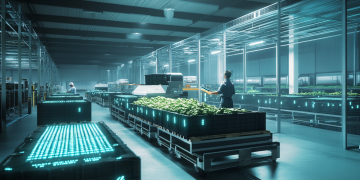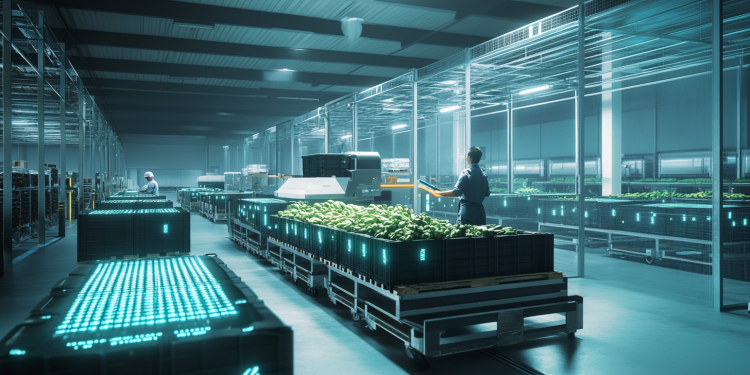By Eva Richardson | The Logistic News
April 10, 2025
As global supply chains race to meet growing consumer expectations and regulatory standards, Japan’s cold chain logistics market is preparing for a transformative decade. Estimated at USD 20.68 billion in 2024, the sector is projected to grow steadily to USD 31.94 billion by 2033, at a compound annual growth rate (CAGR) of 4.70%. This expansion highlights the critical role temperature-controlled logistics now play across the food, pharmaceutical, and biotech industries.
Evolving Demand Meets Technological Evolution
Japan, with its aging population, tech-savvy consumers, and appetite for high-quality imports, has become a central arena for cold chain innovation. From ready-to-eat seafood to life-saving vaccines, the stakes for time- and temperature-sensitive cargo have never been higher.
“The rise in perishable consumption—combined with Japan’s emphasis on quality and safety—requires next-generation logistics solutions,” said Takashi Watanabe, Director of Supply Chain Operations at a Tokyo-based logistics firm.
Advanced tracking systems, AI-powered demand forecasting, and real-time environmental monitoring are being rapidly adopted across major hubs, including Tokyo, Osaka, and Nagoya. The integration of these technologies is not just enhancing operational accuracy but significantly reducing spoilage and energy waste.
Cold Chain Backbone: Storage, Transport, and Beyond
Japan’s cold chain infrastructure is broadly segmented into three service areas: storage, transport, and value-added services. While storage and transportation remain core, services like blast freezing, repackaging, and product relabeling are growing in importance as retailers and producers seek tailored solutions for increasingly fragmented markets.
In terms of temperature range, the market is divided into chilled (0°C to 15°C) and frozen (below 0°C) segments. Chilled logistics currently dominate, particularly in the dairy, fresh produce, and seafood sectors, but frozen applications are gaining traction due to demand for longer shelf life and bulk importation of overseas goods.
Pharmaceuticals Drive Growth Amid Regulatory Demands
The pharmaceutical and life sciences sectors represent one of the fastest-growing verticals in Japan’s cold chain logistics landscape. With the government’s push for increased vaccine stockpiling and robust emergency preparedness systems, demand for ultra-low temperature storage and transport has surged.
“Regulatory compliance in pharma logistics is no longer optional—it’s a strategic advantage,” said Marie Takeda, Head of Healthcare Logistics at a Yokohama-based freight company. “We’re seeing enormous investment in GDP-certified storage hubs and temperature-controlled delivery systems.”
Sustainability: From Buzzword to Baseline
Japan’s cold chain logistics providers are also under pressure to reduce their environmental footprint. Many companies are pivoting toward energy-efficient vehicles, solar-powered warehouses, and eco-friendly packaging.
At the Torija site, for example, GEODIS recently launched a reverse logistics program to reduce waste from large household returns. Similar initiatives are now being studied for deployment in the Japanese market, where consumer awareness around climate issues is high.
Strategic Market Players and Regional Strengths
Global and regional players such as “K” Line Logistics, Kuehne + Nagel, and Yamato Transport are actively scaling operations in Japan. These firms are focusing on data-driven logistics, localized customer service, and cross-border connectivity, especially with Southeast Asia and North America.
Regions such as Kanto (Tokyo), Kansai (Osaka), and Chubu (Nagoya) are emerging as cold chain powerhouses due to their robust transportation infrastructure and dense consumer bases.
Outlook: Agile, Resilient, and Data-Led
The next decade will be shaped by Japan’s ability to fuse automation, sustainability, and human oversight into a cold chain ecosystem that is agile, data-rich, and consumer-centric.
As the market adapts to new challenges—including geopolitical shifts, climate risk, and e-commerce surges—those players who prioritize innovation and customer value will lead the charge.
“In Japan, logistics is not just about moving goods. It’s about preserving integrity, safety, and trust,” said Hiroshi Nakamura, logistics analyst at Nippon Supply Chain Forum. “And cold chain is where this mission is most critical.”
For more exclusive insights into the future of logistics in Asia and beyond, stay tuned to The Logistic News.























